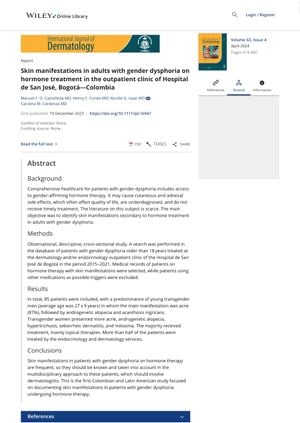Skin Manifestations in Adults with Gender Dysphoria on Hormone Treatment at Hospital de San José, Bogotá-Colombia
December 2023
in “
International Journal of Dermatology
”

TLDR Adults with gender dysphoria on hormone treatment often have skin problems like acne, which are common but not always recognized.
The study titled "Skin manifestations in adults with gender dysphoria on hormone treatment in the outpatient clinic of Hospital de San José, Bogotá—Colombia" is an observational, descriptive, cross-sectional study that included 85 patients, predominantly young transgender men with an average age of 27 ± 9 years. The study found that skin manifestations secondary to hormone treatment in adults with gender dysphoria are frequent and often underdiagnosed. The main manifestation was acne (87%), followed by androgenetic alopecia and acanthosis nigricans. Transgender women presented more acne, androgenetic alopecia, hypertrichosis, seborrheic dermatitis, and melasma. The majority of patients received treatment, mainly topical therapies, and were treated by the endocrinology and dermatology services. The study concludes that these skin manifestations should be known and taken into account in the multidisciplinary approach to these patients, which should involve dermatologists.












